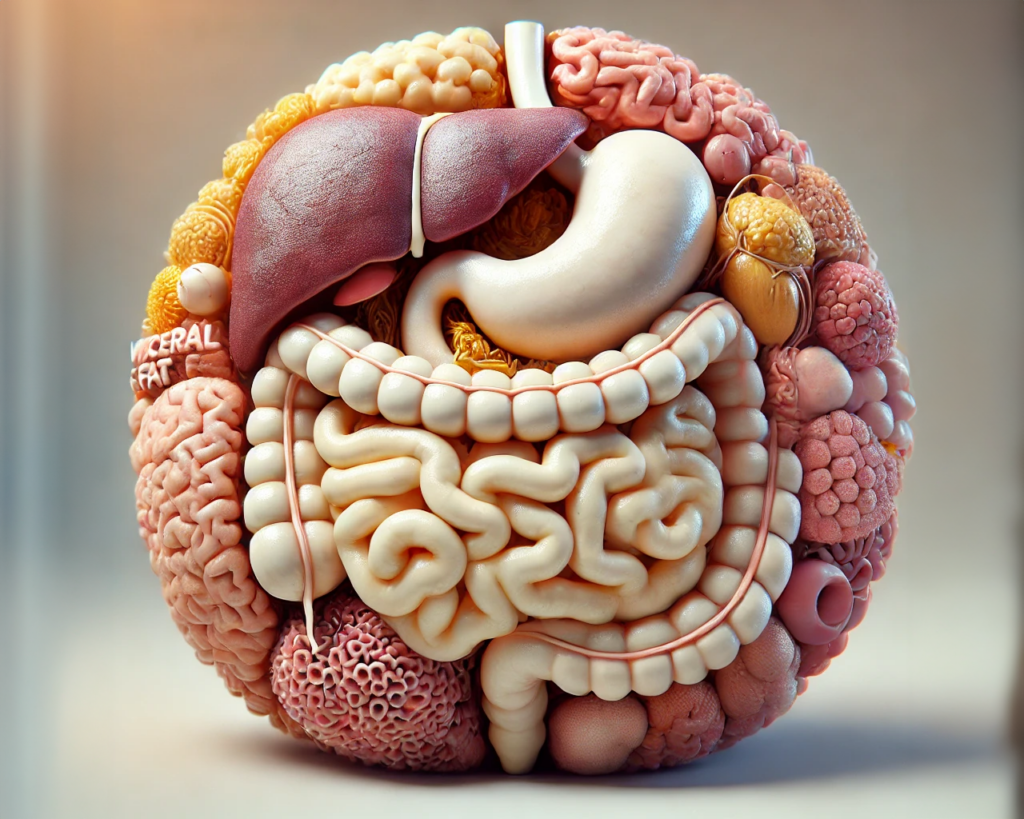Why You Need to Know:
Because it is a hidden health risk that in addition to other problems, contributes to chronic inflammation that in turn contributes to serious diseases. The inflammatory molecules released by visceral fat increase your risk of heart disease, insulin resistance, and neurodegenerative conditions like Alzheimer’s Disease. Managing visceral fat is critical for reducing inflammation throughout the body.
Visceral Fat and Inflammation: The Hidden Health Risk
Visceral fat refers to the fat stored deep inside the abdominal cavity, surrounding important internal organs like the liver, pancreas, and intestines. Unlike subcutaneous fat (the fat you can pinch just under the skin), this type of fat is more metabolically active and has a profound impact on inflammation. It releases pro-inflammatory molecules called adipokines, such as tumor necrosis factor-alpha (TNF-α) and interleukin-6 (IL-6), which can lead to chronic, low-grade inflammation throughout the body.
In addition, visceral adipose tissue is a known contributor to metabolic syndrome, insulin resistance, and other chronic diseases like heart disease and type 2 diabetes. Over time, the constant release of inflammatory molecules from visceral fat stresses the immune system and damages blood vessels, leading to widespread inflammation and increasing the risk of systemic diseases.
Action Items – Visceral Fat & Inflammation:
- Adopt an Anti-Inflammatory Diet:
A diet rich in whole grains, lean proteins, and omega-3 fatty acids can help reduce visceral fat and inflammation. Studies show that individuals who follow a Mediterranean diet have lower levels of visceral fat and CRP (a marker of inflammation) by as much as 30% (Esposito et al., 2010). - Engage in Regular Physical Activity:
High-intensity interval training (HIIT) and Zone 2 cardio are particularly effective at reducing visceral fat. According to a study in Obesity Reviews, 30 minutes of moderate-intensity aerobic exercise 4-5 times a week can significantly decrease visceral fat and reduce inflammation markers. - Manage Stress with Relaxation Techniques:
Regular practice of yoga, meditation, or deep breathing exercises can lower cortisol levels and reduce the risk of visceral adipose tissue accumulation. A study published in Psychosomatic Medicine found that stress reduction programs reduced cortisol levels and visceral fat in participants by up to 20%. - Prioritize Sleep:
Getting 7-9 hours of quality sleep per night helps regulate hormones that control fat storage. Poor sleep increases cortisol and inflammatory markers, leading to more visceral adipose tissue accumulation. Research in PLOS ONE shows that individuals with sleep deprivation are more likely to store fat around the abdomen and have elevated CRP levels. - Limit Sugar and Refined Carbohydrates:
Reducing the intake of sugary beverages and refined carbohydrates can help prevent visceral adipose tissue buildup. A Journal of Nutrition study found that people who consume fewer added sugars have significantly lower visceral adipose levels and reduced markers of inflammation.
Trivia:
Visceral fat is sometimes referred to as “active fat” because of its ability to produce hormones and inflammatory molecules.


